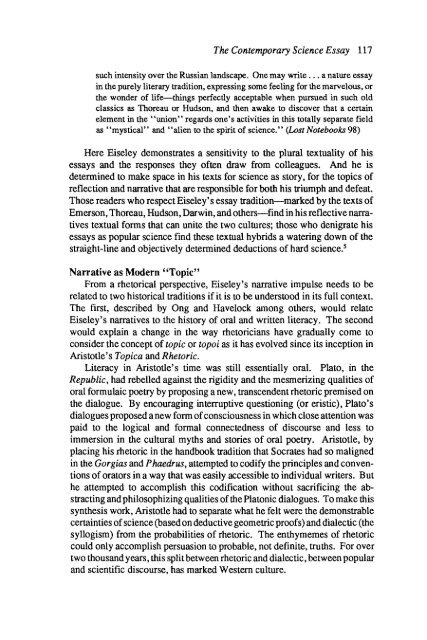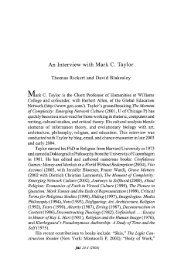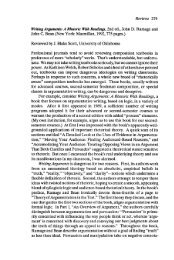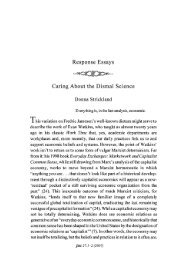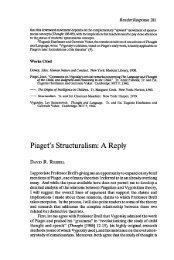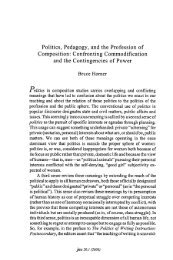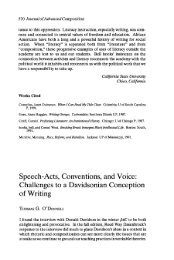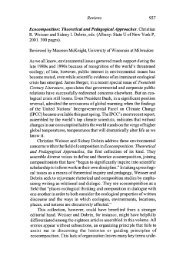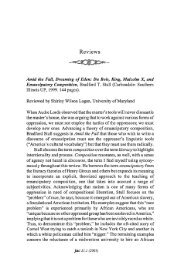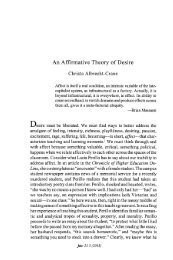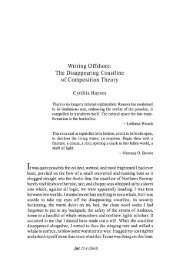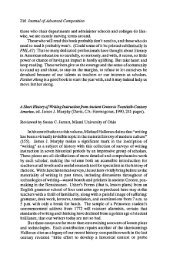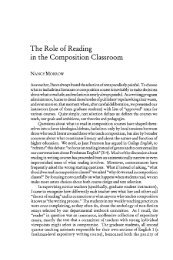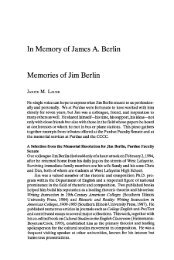Narrative Topic and the Contemporary Science Essay ... - JAC Online
Narrative Topic and the Contemporary Science Essay ... - JAC Online
Narrative Topic and the Contemporary Science Essay ... - JAC Online
You also want an ePaper? Increase the reach of your titles
YUMPU automatically turns print PDFs into web optimized ePapers that Google loves.
The <strong>Contemporary</strong> <strong>Science</strong> <strong>Essay</strong> 117<br />
such intensity over <strong>the</strong> Russian l<strong>and</strong>scape. One may write ... a nature essay<br />
in <strong>the</strong> purely literary tradition, expressing some feeling for <strong>the</strong> marvelous, or<br />
<strong>the</strong> wonder of life-things perfectly acceptable when pursued in such old<br />
classics as Thoreau or Hudson, <strong>and</strong> <strong>the</strong>n awake to discover that a certain<br />
element in <strong>the</strong> "union" regards one's activities in this totally separate field<br />
as • 'mystical" <strong>and</strong> ,. alien to <strong>the</strong> spirit of science .•• (Lost Notebooks 98)<br />
Here Eiseley demonstrates a sensitivity to <strong>the</strong> plural textuality of his<br />
essays <strong>and</strong> <strong>the</strong> responses <strong>the</strong>y often draw from colleagues. And he is<br />
determined to make space in his texts for science as story, for <strong>the</strong> topics of<br />
reflection <strong>and</strong> narrative that are responsible for both his triumph <strong>and</strong> defeat.<br />
Those readers who respect Eiseley's essay tradition-marked by <strong>the</strong> texts of<br />
Emerson, Thoreau, Hudson, Darwin, <strong>and</strong> o<strong>the</strong>rs-find in his reflective narratives<br />
textual forms that can unite <strong>the</strong> two cultures; those who denigrate his<br />
essays as popular science find <strong>the</strong>se textual hybrids a watering down of <strong>the</strong><br />
straight-line <strong>and</strong> objectively determined deductions of hard science.s<br />
<strong>Narrative</strong> as Modern "<strong>Topic</strong>"<br />
From a rhetorical perspective, Eiseley's narrative impulse needs to be<br />
related to two historical traditions if it is to be understood in its full context.<br />
The first, described by Ong <strong>and</strong> Havelock among o<strong>the</strong>rs, would relate<br />
Eiseley's narratives to <strong>the</strong> history of oral <strong>and</strong> written literacy. The second<br />
would explain a change in <strong>the</strong> way rhetoricians have gradually come to<br />
consider <strong>the</strong> concept of topic or topoi as it has evolved since its inception in<br />
Aristotle's <strong>Topic</strong>a <strong>and</strong> Rhetoric.<br />
Literacy in Aristotle's time was still essentially oral. Plato, in <strong>the</strong><br />
Republic, had rebelled against <strong>the</strong> rigidity <strong>and</strong> <strong>the</strong> mesmerizing qualities of<br />
oral formulaic poetry by proposing anew, transcendent rhetoric premised on<br />
<strong>the</strong> dialogue. By encouraging interruptive questioning (or eristic), Plato's<br />
dialogues proposed a new form of consciousness in which close attention was<br />
paid to <strong>the</strong> logical <strong>and</strong> formal connectedness of discourse <strong>and</strong> less to<br />
immersion in <strong>the</strong> cultural myths <strong>and</strong> stories of oral poetry. Aristotle, by<br />
placing his rhetoric in <strong>the</strong> h<strong>and</strong>book tradition that Socrates had so maligned<br />
in <strong>the</strong> Gorgias <strong>and</strong> Phaedrus, attempted to codify <strong>the</strong> principles <strong>and</strong> conventions<br />
of orators in a way that was easily accessible to individual writers. But<br />
he attempted to accomplish this codification without sacrificing <strong>the</strong> abstracting<br />
<strong>and</strong> philosophizing qualities of <strong>the</strong> Platonic dialogues. To make this<br />
syn<strong>the</strong>sis work, Aristotle had to separate what he felt were <strong>the</strong> demonstrable<br />
certainties of science (based on deductive geometric proofs) <strong>and</strong> dialectic (<strong>the</strong><br />
syllogism) from <strong>the</strong> probabilities of rhetoric. The enthymemes of rhetoric<br />
could only accomplish persuasion to probable, not definite, truths. For over<br />
two thous<strong>and</strong> years, this split between rhetoric <strong>and</strong> dialectic, between popular<br />
<strong>and</strong> scientific discourse, has marked Western culture.


